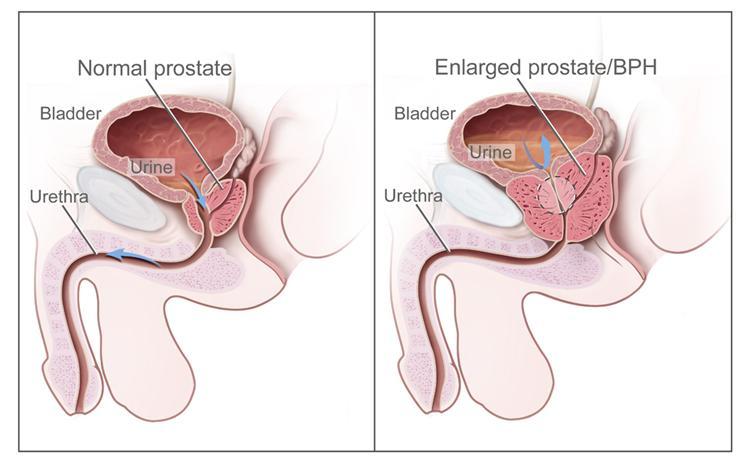Back
Why Do I Feel Pressure in My Rectum? (male)
By Shannon Strauch, PTA, STMT-1 on 4/12/2024
Pain or pressure in the rectum for men can be caused by various factors. Here are some common reasons:
Hemorrhoids:
Swollen veins in the rectal area can cause pain, itching, and a feeling of pressure.Anal fissures:
Small tears in the lining of the anus can lead to pain and discomfort, especially during bowel movements.Prostatitis:
Inflammation of the prostate gland can cause pain in the pelvic area, including the rectum.Constipation:
Straining during bowel movements due to constipation can cause discomfort and pressure in the rectum.Anal abscesses or fistulas:
Infections or abnormal passageways near the anus can result in pain and pressure.Prostate issues:
Enlargement of the prostate (benign prostatic hyperplasia, BPH) or prostate cancer can cause rectal pain or pressure.
Inflammatory bowel disease (IBD):
Conditions like Crohn's disease or ulcerative colitis can cause inflammation and pain in the rectum.Proctalgia Fugax:
A condition characterized by sudden, severe pain in the rectal area. The pain typically occurs without any warning and can last from seconds to minutes.Levator ani syndrome:
is chronic or recurrent pain in the pelvic floor muscles, specifically the levator ani muscles, most likely due to muscle spasms. This pain is often described as a dull ache, pressure, or a feeling of fullness in the rectum. The pain may worsen with sitting or during bowel movements.Rectal prolapse:
is a condition in which the rectum protrudes from the anus. This can present as a feeling of a bulge or mass protruding from the anus, pain or discomfort in the rectal area, difficulty controlling bowel movements (fecal incontinence), bleeding or mucus discharge from the rectum.Sexually transmitted infections (STIs):
Certain infections, such as gonorrhea or chlamydia, can cause rectal discomfort or pain in men who engage in anal sex.
It's essential for men experiencing persistent or severe rectal pain or pressure to see a healthcare provider for proper diagnosis and treatment.
Pelvic floor therapy can help with pain or pressure in the rectum for men by addressing underlying issues related to the pelvic floor muscles. Here's how it can be beneficial:
Muscle Relaxation:
Pelvic floor therapy includes techniques to help relax tense or overactive pelvic floor muscles. This can reduce pain and discomfort in the pelvic area, including the rectum.Improved Coordination:
Some men may experience issues with coordination and function of the pelvic floor muscles. Pelvic floor therapy can help improve muscle coordination, which can alleviate symptoms like pain and pressure in the rectum.Strengthening:
In cases where pelvic floor muscles are weak, therapy can include exercises to strengthen these muscles. Strengthening the pelvic floor can provide better support for the rectum and surrounding structures, reducing symptoms of pain and pressure.Biofeedback:
Pelvic floor therapy often incorporates biofeedback techniques. This involves using sensors to monitor pelvic muscle activity, providing visual or auditory feedback. It helps individuals learn how to control and relax their pelvic floor muscles effectively.Education and Lifestyle Changes:
Pelvic floor therapists educate patients about proper bowel habits, posture, and lifestyle changes that can improve pelvic floor function. This holistic approach can contribute to reducing rectal pain and pressure.Treatment for Specific Conditions:
Pelvic floor therapy can target specific conditions contributing to rectal pain, such as pelvic floor dysfunction, prostatitis, or constipation. Tailored treatment plans are designed based on individual needs and diagnoses.
Overall, pelvic floor therapy aims to restore balance, function, and strength to the pelvic floor muscles, which can significantly alleviate symptoms of rectal pain or pressure in men. It's essential to consult with a qualified pelvic floor therapist or healthcare provider for an accurate assessment and personalized treatment plan.
Read More:
How Chronic Pelvic Congestion in Men Contributes to Prostatitis By Shannon Strauch, PTA, STMT-1 on 12/11/2024 How lymphatic issues can cause symptoms of prostatitis Prostatitis and Tight Pelvic Floor Muscles: A Comprehensive Guide By Shannon Strauch, PTA, STMT-1 on 12/10/2024 How a tight pelvic floor can be the reason for prostatitis symptoms
Are you ready to live pain free?
Request An Appointment